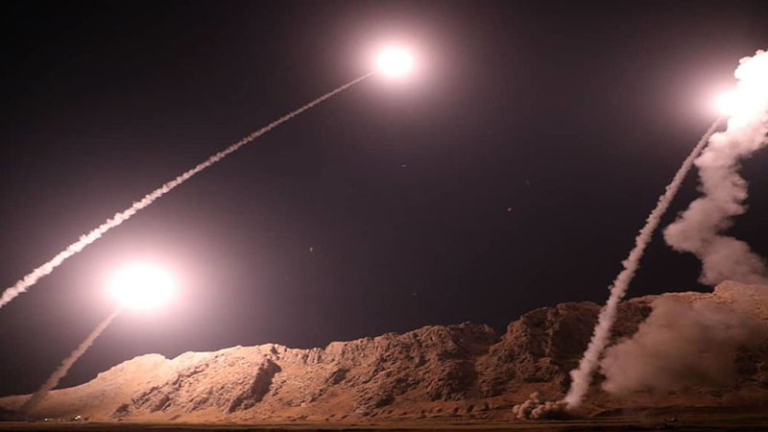
Rare are the occasions when a purportedly capable country’s determined military response to attack turns out to be a mere theatrical performance. Such was the case with the much touted and feared Iranian retaliation for Israel’s April 1 strike on the Islamic Republic’s consulate in Damascus and the killing of top Islamic Revolutionary Guard Corps commanders. On the night of April 13-14, Iran launched hundreds of suicide drones and missiles against targets in Israel, but most were intercepted by Israeli, US, British, and other forces before they arrived, limiting their damage and potentially blunting any talk of a large-scale Israeli reprisal. In the end, the attack was significant as a political spectacle because it caused minimal damage while injuring only an unfortunate Palestinian Arab child, according to Israeli sources.
To be sure, since April 1 Iran’s leadership made clear that Tehran wanted to assure its Arab neighbors, Israel, the United States, and the entire world, that it did not seek escalation, but that it needed to telegraph a response in order to satisfy domestic demands. After all, Israel’s illegal attack on the Iranian consulate in Damascus, in contravention of international law, left Iran no choice but to address it, especially because neither the United Nations General Assembly nor the Security Council found it necessary to convene to discuss this violation. Besides, with intense competition among regime factions in Iran, and with the pro-Iranian Axis of Resistance looking to Tehran to at least defend its own sovereignty, a response to save face was unavoidable.
But it looks like the Iranian response is over, for now, so long as Israel refrains from escalating the situation. In fact, Iranian officials were keen to send messages to that effect. Iran’s UN Ambassador, Amir Saeid Iravani, wrote on X (formerly Twitter) as the drones and missiles were still in the air that “the matter can be deemed concluded” and warned against further action by Israel. Following the attack, Iran’s Army Chief of Staff Major General Mohammad Bagheri telegraphed that Iran will retaliate again if Israel responds, meaning that as far as the Islamic Republic is concerned, the issue has been settled. It is thus up to Israel’s war cabinet whether the matter is put to rest, or if escalation is the order of the day. With war cabinet member Benny Gantz announcing that Israel will decide when to respond, it seems that the region will get at least a breather before more serious action is initiated.
Saturday’s direct Iran-Israel military confrontation may be over, but it is likely to produce three stark outcomes. Iran may have addressed the domestic clamor for a necessary response to Israel’s violation of its sovereignty, but the scale of its attack and its utter failure as a military action may have sent two related messages to friend and foe alike. The first is that despite the bravado and threats, the Islamic Republic is no fighting tiger when it comes to taking on its declared mortal enemy, supported as Israel is by the United States and other western powers. The second is that Iran, as the leader of the Axis of Resistance, is not genuinely interested in putting its regime and its material wellbeing where its rhetoric is. To be sure, these messages translate into a disadvantageous conclusion: when the going gets tough, Iran is no more than a paper tiger, particularly in western perceptions, whose faux growl is no threat to anyone.
A further outcome of Iran’s weekend attack relates to its armed affiliates in Iraq, Lebanon, Palestine, Syria, and Yemen. For all intents and purposes, over the last six months of the Israeli war on Gaza—with Lebanon’s Hezbollah arguably in the vanguard—these militias have represented the ideology and purported practice of the Axis of Resistance on behalf of Tehran. But the failure of the Iranian attack, and Tehran’s eagerness to show that it does not seek to inflict pain on Israel or want an escalation, should signal to these affiliates, and to their popular reservoir of support in the different Arab countries, that they could be on their own in their declared confrontation with Israel. Perhaps then they could realize that their best hope for a better future lies in supporting their countries’ legitimate state institutions and in ending their status as quasi states-within-states. Yet, and as a possible corollary, Israel may now logically conclude that it can go all out against Hezbollah, for instance, without fearing that the Islamic Republic will come to the rescue—a remote prospect at any rate, in light of events since October 7.
The third stark outcome is that even though Israel illegally attacked the Iranian diplomatic mission in Damascus, it can bank on American, British, and other unconditional support for its defense against Iranian weapons, international law be damned. This is likely to increase Israel’s impunity and enable it to conduct more attacks more freely against other Iranian assets or to reach other targets from Beirut to Sanaa and all places in between. In fact, in strategic terms, Iran’s attack was a real-life test for Tel Aviv and Washington of the Islamic Republic’s military capabilities, reach, and impact. Israel’s military planners are likely to interpret the failure of Saturday night’s attack as an indication that the Zionist state will from now on have the freedom to conduct operations anywhere without fearing any serious repercussions from Iran.
The views expressed in this publication are the author’s own and do not necessarily reflect the position of Arab Center Washington DC, its staff, or its Board of Directors.

